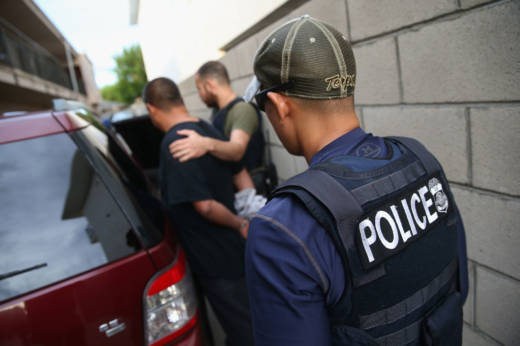Echoing the tone and favored language of President Trump on Twitter, Gov. Brown issued a statement Tuesday night that called the federal lawsuit "SAD!!!" and a political stunt.
Last year, California lawmakers passed three immigration-related laws that feature prominently in the new lawsuit. One bars private employers from voluntarily cooperating with federal immigration officials and requires businesses to notify workers in advance of a federal raid.
A second law restricts state and local law enforcement from voluntarily sharing information with the feds about the release dates of undocumented people in their custody. That law also bars the transfer of undocumented people into federal custody. The third law under federal challenge covers state inspections of detention facilities that hold noncitizens in federal custody.
The Justice Department is asking for a preliminary injunction to block those three laws. To advance their cause, federal lawyers cite a 2012 Supreme Court dispute, in which the Obama administration sued Arizona over its punitive law meant to crack down on immigrants there.
A divided Supreme Court eventually ruled parts of the state law were "pre-empted" under the Supremacy Clause of the Constitution. In essence, the court's five-justice majority said that federal law trumps state law in the immigration area, lest each state develop its own policy toward immigrants.
Attorney General Jeff Sessions, a longtime proponent of immigration restrictions, will speak Wednesday at an annual Law Enforcement Legislative Day hosted by the California Peace Officers' Association in Sacramento.
"The Department of Justice and the Trump administration are going to fight these unjust, unfair and unconstitutional policies that have been imposed on you," Sessions will tell that group, according to an advance excerpt of his remarks. "We are fighting to make your jobs safer and to help you reduce crime in America."
Becerra, a former Democratic representative, will speak to the same group later Wednesday.
In his statement, the state's governor took on Sessions. "At a time of unprecedented political turmoil, Jeff Sessions has come to California to further divide and polarize America," Brown said. "Jeff, these political stunts may be the norm in Washington, but they don't work here. SAD!!!"
In D.C., senior Justice Department officials said California had acted in "quite obviously novel ways" and that the state laws there were "glaring and in some respects go beyond what we've seen" elsewhere. Those officials said the Justice Department is in the process of reviewing other state immigration laws.
The U.S. Justice Department is also locked in courtroom battles with California and other jurisdictions over its threats to withhold federal law enforcement grant money from sanctuary cities, which refuse to voluntarily share information with immigration agents.
Copyright 2018 NPR. To see more, visit http://www.npr.org/.

